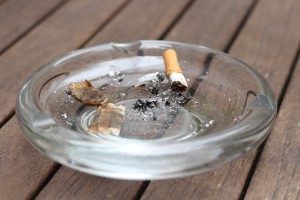Dentist Near Me

It seems like there is a new headline nearly every week featuring someone who swears their teeth are whiter and brighter due to their natural home remedy for stain removal. These articles showcase the idea that whitening can be cheap and easy, if in some cases unpleasant. It can be tempting to consider trying for brighter, whiter teeth without investing time and money on in-office or at-home whitening under a dentist’s care. However, before you pin your hopes on one of these “natural whitening” methods, take a look at the truth behind some of the recent fads.
Fad 1: Oil Pulling
Oil pulling has been cropping up in headlines for months with claims of a wide variety of potential health benefits. It is a very old folk remedy in which a person swishes a tablespoon of edible oil, such as coconut, sunflower, olive, etc., in their mouth and between teeth for up to 20 minutes daily.
Despite the number of years this practice has existed and the number of health issues it purports to treat, there is no evidence that oil pulling whitens teeth or improves health.
Fad 2: Fruits
Due to celebrity endorsement, some people have begun to try rubbing mashed strawberries on their teeth to try to achieve a whiter smile. Others are using lemon or orange peels, and still others tout the virtues of eating pineapple or swishing apple cider vinegar.
However, there is no science to support any of these claims. In fact, one recent study found that brushing with a mixture of baking soda (which is known to have whitening effects on teeth) and strawberries did not whiten teeth. Even worse, the citric acids found in all of these fruits and vinegars can actually be harmful to the enamel on your teeth.
Fad 3: Hydrogen Peroxide
While it is true that many forms of in-office and over-the-counter teeth whitening make use of hydrogen peroxide, there is more to consider before opening a bottle. The hydrogen peroxide used in professional teeth whitening, whether in-office or at-home, is mixed with other substances and provided in a form designed for use in teeth whitening.
Simply swishing from a bottle of hydrogen peroxide will have little or no effect on the whiteness of your teeth, but may cause irritation to your gums and mouth and can be dangerous if accidentally ingested.
If you want whiter, brighter teeth, there are safe and effective ways to achieve your goal. Talk with our doctor for a recommendation for what kind of whitening will be best for your needs. For more information about whitening, contact our office.
2563 Chain Bridge Rd.
Vienna, VA 22181
(703) 281-0902


 Do your children constantly ask for sugary snacks that you know are not good for their health? There are healthy alternatives to the junk food your child loves that taste just as great. Here are a few options to get you started.
Do your children constantly ask for sugary snacks that you know are not good for their health? There are healthy alternatives to the junk food your child loves that taste just as great. Here are a few options to get you started. When you are close to someone you can often be overly comfortable in sharing. This is especially true with kissing. In one kiss, more than 500 germs can be shared between two people. Sharing a kiss can have an impact on your oral health. Here are some of the dangers of kissing.
When you are close to someone you can often be overly comfortable in sharing. This is especially true with kissing. In one kiss, more than 500 germs can be shared between two people. Sharing a kiss can have an impact on your oral health. Here are some of the dangers of kissing. Your teeth age with you. It’s important to keep them strong and healthy even as you grow older. Seniors are at a higher risk for developing periodontal disease. In addition to getting a regular dental examination, here are some other tips to keep your teeth healthy.
Your teeth age with you. It’s important to keep them strong and healthy even as you grow older. Seniors are at a higher risk for developing periodontal disease. In addition to getting a regular dental examination, here are some other tips to keep your teeth healthy. In addition to brushing your teeth twice each day and flossing at least once, it is also important to take good care of your tongue. Bacteria can build up on your tongue throughout the day. For some patients, using a tongue scraper can be the best solution for a cleaner, healthier tongue.
In addition to brushing your teeth twice each day and flossing at least once, it is also important to take good care of your tongue. Bacteria can build up on your tongue throughout the day. For some patients, using a tongue scraper can be the best solution for a cleaner, healthier tongue. The internet is fraught with myths about everything. In this “information age” you might think it would be easy to find the truth, but that’s not always the case. Dentistry is no different. It’s no surprise that dental myths are abundant, especially in regard to some of the more intimidating procedures. However, advancements in dental technology have made it possible to receive the advanced care you need with little to no discomfort. Here are some common myths you might hear about root canals debunked. Contact our dental office to learn more.
The internet is fraught with myths about everything. In this “information age” you might think it would be easy to find the truth, but that’s not always the case. Dentistry is no different. It’s no surprise that dental myths are abundant, especially in regard to some of the more intimidating procedures. However, advancements in dental technology have made it possible to receive the advanced care you need with little to no discomfort. Here are some common myths you might hear about root canals debunked. Contact our dental office to learn more. Cosmetic dentistry has been around for ages. We’ve noticed that now, more than ever, people are concerned with overall wellness in addition to a beautiful smile. In past years, we had many patients come to us seeking whitening and seeming unconcerned with ridding their smile of infection and decay.
Cosmetic dentistry has been around for ages. We’ve noticed that now, more than ever, people are concerned with overall wellness in addition to a beautiful smile. In past years, we had many patients come to us seeking whitening and seeming unconcerned with ridding their smile of infection and decay. Coffee is well-known as hazardous to teeth, but there are things you can do besides cut it out completely. Here are some things to know about coffee’s effects on your oral health and diet, as well as how to mitigate them.
Coffee is well-known as hazardous to teeth, but there are things you can do besides cut it out completely. Here are some things to know about coffee’s effects on your oral health and diet, as well as how to mitigate them. Most serious oral health issues can be prevented by maintaining an effective routine of dental hygiene and in-office care. However, you could be at higher risk for some oral illnesses due to hereditary factors. Awareness and proper treatment can help minimize these risks. Here are a few of the most common oral health concerns that are affected by genetics.
Most serious oral health issues can be prevented by maintaining an effective routine of dental hygiene and in-office care. However, you could be at higher risk for some oral illnesses due to hereditary factors. Awareness and proper treatment can help minimize these risks. Here are a few of the most common oral health concerns that are affected by genetics.